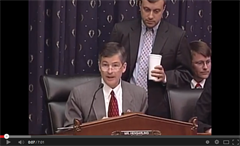 |
| CLICK HERE TO WATCH |
This morning we welcome back Director Cordray to deliver testimony on the fifth semi-annual report of the CFPB.
Protecting consumers within interstate commerce is a vitally important mission of the Federal government. And properly designed, the CFPB is capable of great good on behalf of consumers. It is also capable of great harm. In just three years, the CFPB has grown into an unaccountable federal leviathan of nearly 1,400 employees with over a half billion dollar budget and the unrestrained power to dictate which Americans can receive credit and which Americas cannot. Knowledgeable Americas are rightfully alarmed as the threat and the harm begins to mount.
Since Director Cordray last appeared before our committee in January, we have learned much. First, we have learned in the first quarter of this year we actually had negative economic growth of one percent. And when you speak to practically any small businessperson, any community banker they will tell you the sheer weight, volume, complexity of the regulatory red tape burden is one of the primary reasons that they cannot expand and hire more people.
We hear, for example, from Barry in Chicago. He says he owns a small insurance company, but he said, “I spend most of my days on the CFPB website reading through all of the regulations and trying to implement them into our system. My loan officers can’t believe all the new complicated forms and our borrowers are all confused. The CFPB is adding such cost to the business that only Wells Fargo, Chase, and B of A will be left for consumers to obtain loans.” Regrettably, this is not a unique piece of correspondence. It is one way that the CFPB is, regrettably, harming consumers and helping keep people underemployed and unemployed.
We have also learned since Director Cordray’s last appearance the CFPB is incurring even more costs on its building renovation. What was then going to cost an estimated $145 million is now costing at least $184 million, according to information provided by the Bureau itself. That’s $30 million more than the building is even worth – a building, we must remember, that the CFPB does not even own. This is what happens, I believe, when an agency is essentially unaccountable to the people.
Even more troubling, we have learned since Director Cordray was last before the committee that the joint database project by the CFPB and the FHFA will undeniably collect Personally Identifiable Information on millions of Americans in the National Mortgage Database. I’m not speaking merely of names, addresses and phone numbers – though the database will certainly include those – but shockingly also people’s Social Security numbers, their race, religion, personal financial information, and even the GPS coordinates of their homes. If this is not considered Personally Identifiable Information by the CFPB, then I don’t know what is.
A breach of this database could cause untold harm to consumers by the very agency that purports to protect them. Without a doubt, this National Mortgage Database is an unwarranted and shocking intrusion into the privacy of American citizens. It is a database I would fully expect to see in either Russia or China, but I’m appalled to see it in the United States of America. And I predict as more Americans become aware of this, they, too, will be appalled and will demand accountability from this Administration.
Next we clearly have the most appalling development that has occurred since Director Cordray’s last appearance here: independently corroborated reports of widespread discrimination and abuse of employees at the CFPB. Not merely virtual discrimination, not merely theoretical discrimination or statistical discrimination but appalling acts of actual discrimination. Since these allegations first came to light, this committee has served as a virtual trauma unit for employees who have come forward to report discrimination, retaliation and other apparent violations of law at the CFPB. And although our committee has publicly invited aggrieved employees from every other Federal agency within our jurisdiction to come forward if they have experienced discrimination or retaliation, so far the only ones who have come forward all work or have worked for the CFPB.
Most wish to remain anonymous because they fear retaliation. But as you prepare to give your testimony, Director Cordray, I have no doubt that you are aware we will hear publicly from other whistleblowers this afternoon including one -- Mr. Kevin Williams -- whose testimony has already been delivered to the committee, who will testify later this afternoon about the CFPB: “The frequency and duration of these occurrences, speaking of discrimination, created a hostile work environment for all blacks at the Bureau whether they were unwitting manipulated black managers or mistreated hard-working black employees. It’s just that we, the later, suffered the objectively adverse consequences.” Again, this whistleblower testimony is not unique.
I have no doubt that all agree, including the Director, that invidious discrimination and retaliation are not only illegal, they are also morally repugnant. Until I heard it with my own ears, I never would’ve believed that a Federal office in the 21st century would commonly be referred to as “the plantation.” I, for one, am uninterested in hearing how the “system” is to blame, Director Cordray. I am uninterested in hearing about plans to conduct listening sessions and hiring consultants when the real problem is the people you’ve hired to help you run the Bureau.
These disturbing developments once again demonstrate, I believe conclusively, why there must be substantial structural reform at the CFPB. Consumers deserve accountability – not only from Wall Street but they deserve it from Washington, too. Yet, by design the CFPB remains arguably the least accountable Washington bureaucracy in the history of America and it shows. This must change.